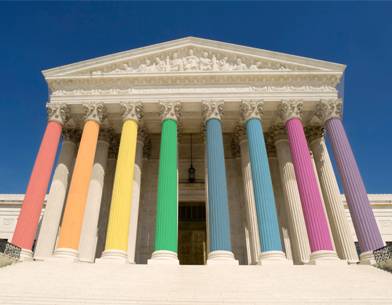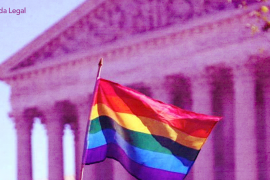
All Hat and No Cattle: 3 Reasons Why Senator Cruz’ Texas-Sized Rant Against ‘Judicial Activism’ is Wrong.
Blog Search
On Monday, the U.S. Supreme Court denied review of decisions in favor of the freedom to marry from the Seventh Circuit, Fourth Circuit and Tenth Circuit Courts of Appeal. As a result same-sex couples in those five more states -- Indiana, Wisconsin, Virginia, Utah and Oklahoma -- began to marry! That same day, Texas Senator Ted Cruz issued a statement where he fumed that this was an example of “judicial activism at its worst” and vowed to defend “traditional marriage” by introducing a federal constitutional amendment.
Really! Give us a break. Here are 3 reasons why Senator Cruz’ Texas-sized rant against ‘judicial activism’ is wrong.
1. This is not “judicial activism.” And by the way, stop saying “judicial activism!”
Cruz: “This is judicial activism at its worst.”
Okay. This statement is actually so wrong, that the reason why it is wrong has two sub parts.
In denying the cert petitions, the Supreme Court took no affirmative action to review the merits of any decision, but rather left in place lower appellate court rulings striking down discriminatory marriage laws in Indiana, Wisconsin, Utah, Oklahoma and Virginia. In other words, the Supreme Court took no action on these cases. What’s more restrained than that?
- a. “Judicial activism” is a political term that is used to attack a judge when the speaker disagrees with a decision, particularly with regard to civil rights. When politicians invoke phrases like “judicial activism” they are playing fast and loose with the public’s confidence in our democratic institutions. It is one thing to criticize the substance of a decision and quite another to impugn a court’s motivation or suggest its authority oversteps the other branches of government. A court’s legitimacy is central to its ability to enforce its rulings. A court’s authority to ensure that the people and their representatives abide by its decisions derives from the willingness of the people to accept their rulings as fair. There will always be those who disagree with the outcome of a decision, but when politicians throw around hyperbolic accusations of “judicial activism” or “legislating from the bench” their words shape the public’s perception in a way that makes it harder for our justice system to do its job.
- b. Since the Supreme Court issued a decision in U.S. v. Windsor, there has been a nearly unbroken string of 41 rulings in 35 cases from 32 different federal and state courts in favor of the freedom to marry. Among the federal courts that have ruled on this issue, only one court has upheld a marriage ban (and just this week Lambda Legal announced that we are joining the appeal to the Fifth Circuit from that Louisiana ruling.) Many of the federal judges who found marriage bans to be unconstitutional were judges who were appointed by Republican presidents. It flies in the face of reason to argue that this overwhelming legal consensus is a result of an “activist judiciary.” Judges have a duty to uphold the Constitution, so when a law infringes on individual rights or equal treatment, judges have a duty to strike it down.
2. Courts protect the rights of all Americans, not just the powerful and popular.
Cruz: “Unelected judges should not be imposing their policy preferences to subvert the considered judgments of democratically elected legislatures.”
Voters and democratically elected legislatures don’t get to decide whether they will “allow” individuals to exercise their constitutionally protected rights. Courts, and the judges who take an oath to administer justice under the Constitution, have a fundamental responsibility to uphold that Constitution, especially when or democratically elected representatives fail to do so. If a court determines that a particular law unconstitutionally discriminates or deprives people of their rights, it is their duty to strike down that law. To quote Judge Richard Posner, who authored the opinion in Lambda Legal’s case Baskin v. Bogan, which struck down discriminatory marriage laws in Indiana and Wisconsin: “Minorities trampled on by the democratic process have recourse to the courts; the recourse is called constitutional law.”
3. States may not violate the U.S. Constitution.
Cruz: “Marriage is a question for the States.”
The 14th Amendment clearly provides that “No state shall … deny to any person … the equal protection of the laws.” It is certainly true that marriage is chiefly regulated by the states, but states may not restrict access to marriage or the benefits and obligations it provides in ways that conflict with the Constitution. State constitutions and laws create additional protections above those guaranteed by the U.S. Constitution, but they cannot provide fewer. The U.S. Constitution establishes a foundation for the protection of human liberty, and the states may not fall below that federal floor.




